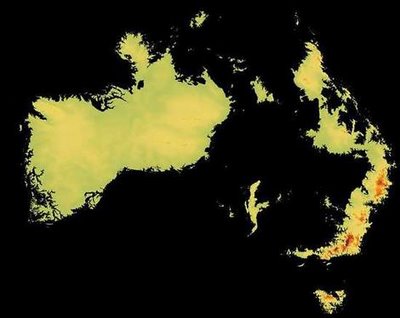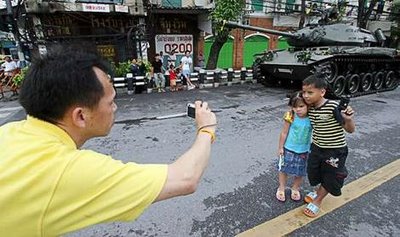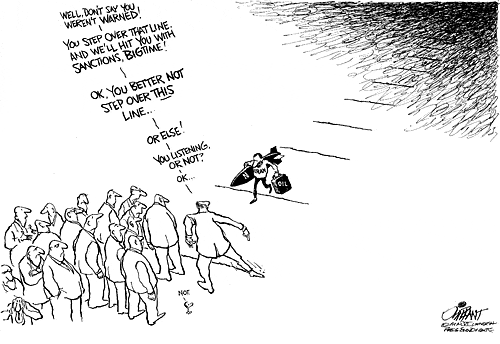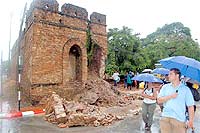I have to say that I agree with John Howard. The angry reaction of Muslims seems so out of all proportionate to the so called offence. It's almost as if they are looking for ways to pick a fight and to then justify a war. It's madness.
I don't know what the Pope thinks about the Muslims but he is entitled to say whatever he feels is appropriate to the situation. What was the context of the quote? It was a scholarly lecture, for crying out loud! Why is it that the Mulims, and especially the militants are so insecure about themselves and their religion.
They bash Christians. They bash Jews. They probably bash others as well... But do these rise up in anger and fury? Not at all. We might not like the things they call us but they have a right to free speech just as I do.
My freedom of speech does need to be tempered with love, and not driven by hatred. I don't hate Muslims. Those I know are wonderful people and I'm delighted to know them and to count them as friends.
There seems to be something very perverse afoot in the world today. It does not feel good. It's divisive and foments hatred and violence. It's time to stop it before whatever it is takes over the world to all of our destruction.
Muslim animosity strange: Howard - World - smh.com.auTHE Islamic world's angry reaction to comments by Pope Benedict was disproportionate, strange and disappointing, the Prime Minister, John Howard, said last night.
"We should take a deep breath on these things and all have a sense of proportion. We seem to be living in a world where people have no sense of proportion," he told the ABC's Lateline program. "OK, they don't like what was said. I'm sure the Pope was not intending to attack Islam. He's expressed his regrets, and I think we should really move on."
As shadowy threats against the Pope and Christianity multiplied, the Vatican dispatched diplomats to capitals of Muslim states to contain anger. Police patrols were increased around hundreds of churches and mosques in many Western countries.
Despite a personal and public apology from Benedict on Sunday, protests continued on Monday in the Muslim world. Governments everywhere recalled that the row early this year over Danish cartoons depicting the prophet Muhammad flared unexpectedly into violence around the world.
In in some countries, conciliatory voices were emerging, but many Muslims said they remained dissatisfied with Benedict's statement because he said he was "deeply sorry" for the outrage his speech provoked but did not apologise for the remarks themselves.
In his speech last week to academics at Germany's University of Regensburg, where Benedict was a theology professor in the 1970s, the Pope quoted a 14th-century Byzantine emperor who regarded some of the prophet Muhammad's teachings as "evil and inhuman".
Iran's Supreme Leader, Ayatollah Ali Khamenei, alleged the Pope's speech was part of a "crusade against Islam" launched by the US President, George Bush. On the sidelines of a United Nations meeting in New York, Mr Bush told the Malaysian Prime Minister, Abdullah Ahmad Badawi, that Benedict's apology was sincere.
Mr Badawi agreed but cautioned the Pope to avoid making further divisive statements. "I think we can accept it, and we hope there are no more statements that can anger the Muslims," Mr Badawi said.
The Iranian President, Mahmoud Ahmadinejad, expressed respect for Benedict and acknowledged the pontiff had "modified" his remarks. But Morocco's King Mohammed sent a letter to the Vatican to protest against the comments.
Angry protests continued on Monday in India, Pakistan, Indonesia and Iraq. Most of the demonstrations have remained fairly small. Guards have been posted at Christian churches in Egypt and in the West Bank and Gaza Strip, where several were firebombed.
Websites linked with Muslim extremists have posted a batch of threats against the Pope and the Vatican. In Britain, police visited clergy in the London area and were asked to contact their local stations urgently to discuss security.
An Italian nun was shot and killed on Sunday in Somalia after a radical cleric there condemned the Pope's speech. An Italian diplomat and his wife were killed on Monday in Morocco - a country that recalled its ambassador to the Holy See in protest - but Italian officials said the case appeared to be a robbery gone wrong.
The Pope is next expected to address pilgrims during his weekly audience at St Peter's Square tomorrow. The Vatican newspaper L'Osservatore Romano published the Pope's expression of regret on its front page Monday in Italian, French, English and - highlighted in the centre - Arabic. Vatican officials confirmed that plans for Benedict's trip to Turkey, scheduled for late November, remained on track.
The Turkish commentator Selcuk Gultasli said the words of regret from the Vatican were encouraging, and Muslims who compared the Pope to Hitler or who attacked churches and shot at nuns were an embarrassment. The chasm between the Islamic world and the West was larger than ever.








